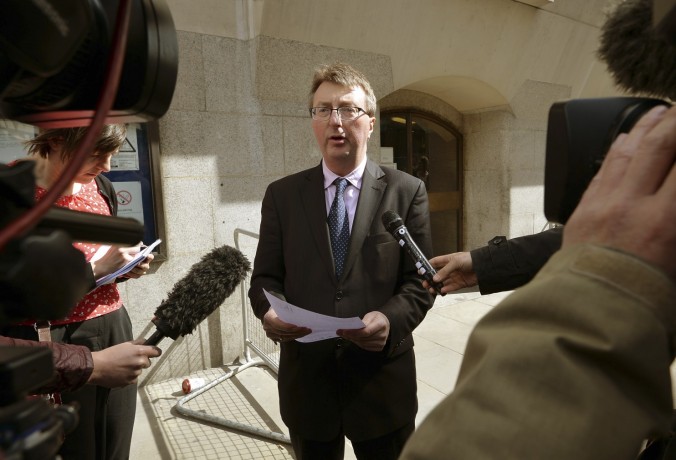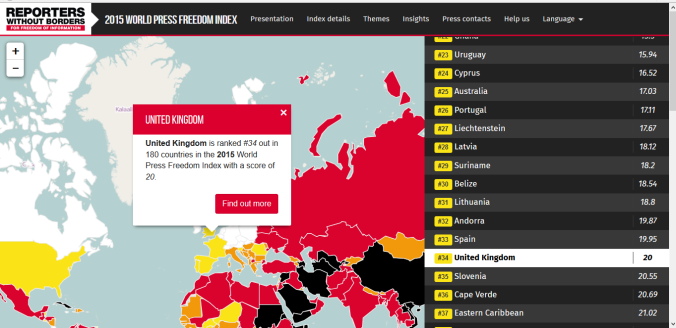We live in an era where our journalists’ are being constantly abused across social media networks, sued by the big powerful guys and (just so you don’t mistake me for being sexist) women. The ones with the big money and fancy lawyers that don’t always appreciate healthy criticism, attacked by ‘keyboard warriors’ who hide behind their keyboards typing death threats and abuse thinking they’re stronger than all Marvel super villains combined. We put our fate in journalists and appoint them as the watchdog over our society and our governments yet we react so ferociously when they do just that. This is not an issue concerning the faraway lands of the oppressed and undeveloped third world countries. No, this is happening right here at home in Great Britain. The country that prides itself in its democracy and transparency.
Reporters Without Borders, a non-profit freedom of information organisation that produces annual reports which list countries and determines their rank depending on how free they are, ranked the United Kingdom as number 34 in its world press freedom index. That’s 4 spots drop from 2013 and a whopping 19 levels plummet from the 2010 report. Considering how important democracy is to the UK and the British public these figures may seem rather shocking but they are true.
According to the organisation the abuse of national security by applying mass surveillance systems and invading every individual’s privacy is the new ugly habit of democratic countries including the United States to fight terrorism. What’s even more shocking to hear is that France and the United Kingdome are, as described by the report, the “worst offenders” when it comes to these laws. The UK has constantly come under scrutiny for allowing police forces to abuse their power and spy on journalists. Just recently 6 journalists are suing the London Met Police following revelations that the department has been spying on these journalists for years. Jason Parkinson, one of the victims taking charges against the Met Police, discovered a file that contained every detail about him including a criminal check of his ex-partner. “The files make it very clear they have been monitoring my movements, with whom I associate and even what clothing I wear, in order for police intelligence units to build up a profile of me and my network of associates and contacts”.
One of the most shocking attacks on the freedom of press by the British government is when they asked the Guardian newspaper to destroy all the documents received by the American whistle-blower Edward Snowden. Snowden exposed to the world how national security agencies are attempting to combat terrorism by applying a mass surveillance system that would spy on every interaction we make via telecommunication. Every text, phone call and site we click is being saved as data that maybe used against you one day. This Orwellian Big Brother scheme attempts to tackle terrorism by treating us all like one. Surveillance is a draconian habit of oppressive societies and one that should not be tolerated in open and democratic societies whatsoever.
Speaking to journalists from the UK, I discovered that the government is not their only problem, what they also dread when doing their job is the pricy legal fees of law suits, the paperwork and sadly numerous death threats. Yasmin Ali-Bhai brown an outspoken columnist from the Independant tells me how she is constantly being asked from her editors to change or sometime even remove certain text from her pieces “In one of my columns, I wrote how this was a very corrupt country, and I was asked by my editors to change the entire column to ‘may be a corrupt country’ all the way through”. These small and often hardly notable ways of disrupting free speech can change a lot of meanings, they happen regularly to journalists but are hardly noticed by readers. I asked Dominic Ponsford editor at the Press Gazette how they deal with these lawsuits and does it affect the way they do their job? He says it depends on how big the publication you’re working for is and how much it is willing to pay the legal fees otherwise you may end producing important material for the public interest but forbidden from publishing it. What this means for investigative journalists especially, is that these law suits will serve as a means of deterrence and intimidation for one of the most respected fields in the industry. As for freelance journalists working independently on the field and submitting their work to different publications they face different problems. Lynda Bowyer, a freelance journalist with 25 years of experience has always worked independently. The reason she tells me, is “so that I can create news as I see it and dispatch news packages to news agencies as I see it without it being bias by editorial”. Is that something that happens often? I ask. “Oh yes massively… there are certain mainstream news titles in the industry that have very clear cut political persuasion and I fear that that clouts the reality of the news story. When someone automatically reads a news story, instead of reading a factual account, you will find it being editorially rendered down so it suits the political persuasions of the newspaper or the stakeholders in the committee”.
Now the press has not always been innocent in the UK. Following the phone hacking scandal in 2011, many corrupt journalists were found guilty of hacking celebrities’ and important figure’s phones. Perhaps the worst crime they committed which breached all sorts of NUJ guidelines was the interference with the missing teenager Milly Dowler’s voicemail which gave her family hope that she may be alive only to feel completely betrayed and heartbroken to realize the press were behind deleting the contents of the voicemail. This sort of behaviour is unacceptable for a practising journalists. Fortunately all those involved were brought to justice and this led to the dissemination of the Leveson report in 2012. The report had a massive impact on the press and will perhaps come to change the future of journalism in Britain for years to come. The report states that an independent figure will be formed to regulate the press from this sort of activity. This means that the press will be regulated in the UK which wasn’t the case in the past (well not officially). Leveson acknowledges the importance of the free press and describes it as the ‘safeguard of our democracy’ but that there had been many instances in the past where the press has simply ignored the guidelines and acted out of the public’s interest and caused distress to the ordinary members of the public. As a result the regulating body will take into account first and foremost the public’s interest at heart before prosecuting. It seems that this is slowly being implemented such as the acquittal of the sun journalists who were released after being charged for paying public officials for information. That information revealed stories that were within the public’s interest and fortunately the jury accepted their innocence.

Graham Brough, one of The Sun journailsts being interviewed after his release. Photo provided by Washington Post via Photographer: John Stillwell from the Associated Press
It is a relief to see these journalists set free. Perhaps the public have not lost complete fate in journalism and will continue to support journalists after all. Journalists are our only hope to achieve justice and an open society and they should be granted security to their job without fear of harassment, death threats or placing them with criminals on our anti-terrorism databases not just in the UK but everywhere around the world. And by us giving them that right they should not abuse it to create stories they cannot tell us through via traditional, legal and ethical ways.
A democratic country that allows the absolute freedom for press should not be a distant dream. We live in the 21 century we have evolved and overcome many obstacles to reach the civilised place where we are now and we shouldn’t take that for granted. All the sad and terrible things that are happening in the world today, every sad story waiting to be told, every voiceless victim that needs to speak. They all dream of their stories to be told, to find justice. Journalism has for a long time served for this purpose, they tell stories that other can’t tell they face bullets others can’t face and if we surround them with the pressure to only tell the stories we want to hear, who’s to say what stories demand to be told and which don’t.
